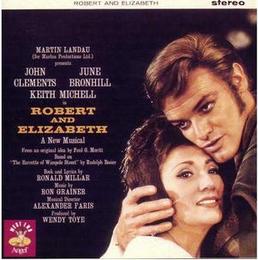|
Well, okay, this is another of those, "I can't believe I found this -- and that it even exists" video. One of my two favorite, little-known musicals is the British show, Robert and Elizabeth. (The other, you will not be shocked to learn, is Pickwick. I'd almost include Fiorello!, but since it won the Tony Award and Pulitzer Prize, I don't think it qualifies enough...) Robert and Elizabeth is based on the famous play, The Barretts of Wimpole Street, which was made into a popular film. It tells the story of two of the most popular poets in the English, Robert Browning and Elizabeth Barrett -- she a sickly young woman kept under the thumb of her deeply-domineering, monstrous father, and he an enthusiastic admirer who falls in love with her against her insistence and determines to get her out of the house, marry her, and take her to Italy for her health. The show had a very respectable run in London's West End, opening in 1964 playing for 948 performances, over two years. (Needless-to-say, it's not unknown in England, where among other productions it was revived in 1987 at the Chichester Festival.) What the show also had is one of the most magnificent, lush, often funny, and romantic scores -- intelligent and beautifully crafted -- one that I considered the British equivalent of My Fair Lady. And for a show based on two great poets, the lyricist Ronald Millar had the challenge of an incredibly high standard to live up to (when Elizabeth Barrett and Robert Browning sing, it had darn-well better soar and be poetic, yet as a song is a musical be accessible) -- a level I think he reached throughout the show. I linked to one of his best lyrics here, a song called, "I Said Love." The music is by Ron Grainer. The two stars of the show were Keith Michell and June Bronhill. Michell might actually be known to some in the U.S. He came to fame here as the star of the Masterpiece Theatre production of The Six Wives of Henry VIII. And then in the 1980s he had a recurring role on Murder, She Wrote as a Dennis Stanton, former jewel thief who became an insurance investigator. (He also starred in the original London production of Man of La Mancha.) June Bronhill was an accomplished and successful Australian opera singer. Despite its long run in London, the show never played on Broadway, an oddity I could never figure out, particularly since that was an era when so many British musicals did come over to New York. One thing I'd read was that despite its long run, it was a very expensive show and didn't necessarily make a profit. But that struck me as odd, and I didn't think it could be the reason. But then I later read that there was a copyright problem with the estate of Robert Besier, the author of The Barretts of Wimpole Street, and it was that which prevented it opening on Broadway. I have no idea, but that strikes me as far more likely the unfortunate reason. My folks saw the original West End production which was hope I came to know the cast album. They loved the show, and from hearing the score only, I can tell why. (By the way, earlier I referred to the father as "monstrous." That was the word my parents always used, which I assume was hyperbolic for "an overbearing man." Years later, I got the script of the show and read it and -- well, let's just say they weren't being hyperbolic. "Monster" is a fine term. Yet oddly, the father was even worse than what was portrayed in the musical. When I finally saw the film version -- and you can tell exactly where the songs went -- Charles Laughton played the father, and his being a monster was there in full force. Monstrous as he was in the stage musical, it turned out to have been toned down because, I suspect, there are just some things that they probably felt would have been problematic for an audience watching a lush, romantic musical.) Of all the wonderful songs in Robert and Elizabeth, and all the romantic numbers, one stands out as the Love Ballad, a song that ends Act One, "I Know Now, when Elizabeth acknowledges her love for Robert, and his joy with her soars through the theater. And the song is reprised at the final curtain as they head off to Italy. I've listened to the score repeatedly over the years, and have tried to find any video of it, but to no avail. There is some live audio of the Australian production -- which June Bronhill starred in, re-creating her role as Elizabeth, opposite the fine actor Dennis Quilley -- and it's quite good to hear, but it's not the original, it's not Keith Michell, and it's not video. So, that's been a big no-go. Until now. I found this last night. Here, in full costume, performing the big love ballad duet, "I Know Now," are June Bronhill and Keith Michell. The official term for this is, "Hubba. O joy!!" And in case you couldn't tell -- this, folks, is the definition of a Power Ballad.
0 Comments
Leave a Reply. |
AuthorRobert J. Elisberg is a political commentator, screenwriter, novelist, tech writer and also some other things that I just tend to keep forgetting. Feedspot Badge of Honor
Archives
June 2024
Categories
All
|
|
© Copyright Robert J. Elisberg 2024
|







 RSS Feed
RSS Feed